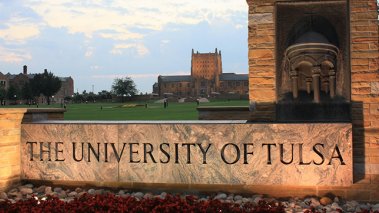Table of Contents
U. of Tulsa Suspends Student for Someone Else’s Facebook Post

TULSA, Okla., February 12, 2015—In a triple blow to free speech, due process, and freedom of the press, the University of Tulsa (TU) arbitrarily banned a student from campus until 2016 for Facebook posts that someone else admitted to writing and then attempted to intimidate student journalists who were trying to cover the story.
“The University of Tulsa’s speech police are putting in some serious overtime on this case,” said Peter Bonilla, Director of the Individual Rights Defense Program at the Foundation for Individual Rights in Education (FIRE). “Punishing someone for the speech of a friend or relative might be par for the course in a dictatorship, but it has no place on our nation’s college campuses. Worse, TU wants to hide how it’s ignoring its own rules from the oversight of campus courts or the student press.”
TU suspended student George “Trey” Barnett last October for three Facebook posts published by his husband that criticized another student and two TU faculty members. None of the Facebook posts came from Barnett’s account; the statements were posted by his husband, who either tagged Barnett or posted them directly to Barnett’s Facebook page. Barnett’s husband later submitted a sworn affidavit attesting to his sole authorship of the posts. Nevertheless, shortly after TU professor Susan Barrett filed a complaint against Barnett arguing that Barnett could not “avoid responsibility” because someone else was responsible for the posts, TU Senior Vice Provost Winona Tanaka imposed eight restrictive interim measures against Barnett. The sanctions included suspending his participation in certain courses and activities and even barring him from speaking about certain individuals.
Without affording him the hearing he was entitled to under TU’s University Student Conduct Policies & Procedures, and despite his husband’s affidavit, Tanaka found Barnett responsible for “harassment.” Tanaka also found Barnett guilty of retaliation and violating confidentiality requirements for speaking about the disciplinary charges with his husband—who was also his exculpatory witness.
Less than two months before Barnett was set to graduate, Tanaka not only suspended him until at least 2016 but also permanently banned him from receiving a degree in his major even upon his re-enrollment. Barnett was forced to wait two months for TU to respond to his appeal, which the university summarily denied on January 9 without explanation—leaving Barnett unable to earn his theater degree as planned.
FIRE wrote to TU in October, explaining that holding Barnett responsible for a third party’s actions violated basic principles of fairness and due process, that the misapplication of TU’s harassment policies violated its promises of freedom of expression to its students, and that it is unconscionable to punish a student for discussing charges against him with a third party. TU did not respond to FIRE’s letter.
TU has also threatened the expressive rights of the staff of its independent student newspaper, The Collegian, which this week reported on Barnett’s suspension and criticized his treatment. The Collegian reports that after contacting TU administrators for comment, student reporters were told by TU’s director of marketing and communications that if “anything that the university deems to be confidential” is “published or shared, (that) could violate university policies.” The university refused to explain what might constitute “confidential” information and, come press time, the journalists were unsure what action the university might take against them.
“TU students are right to be concerned about their free speech and due process rights, given the university’s sheer vindictiveness in banishing Barnett and its treatment of their student newspaper,” said Bonilla. “We’ve warned TU about its dangerously overbroad harassment policy before, yet it continues to fly in the face of its promise that students retain ‘the rights and privileges granted to all citizens in the Bill of Rights.’ The university needs to be held accountable for breaking that promise.”
FIRE is a nonprofit educational foundation that unites civil rights and civil liberties leaders, scholars, journalists, and public intellectuals from across the political and ideological spectrum on behalf of individual rights, freedom of expression, academic freedom, due process, and rights of conscience at our nation’s colleges and universities. FIRE’s efforts to preserve liberty on campuses across America can be viewed at thefire.org.
CONTACT:
Nico Perrino, Associate Director of Communications, FIRE: 215-717-3473; nico@thefire.org
Recent Articles
FIRE’s award-winning Newsdesk covers the free speech news you need to stay informed.

Texas tramples First Amendment rights with police crackdown of pro-Palestinian protests

Here’s what students need to know about protesting on campus right now

Kansas takes a stand for intellectual freedom
